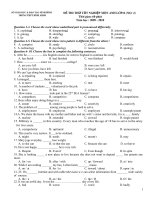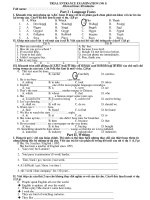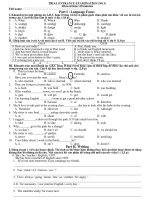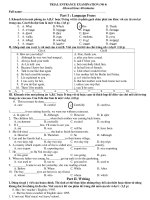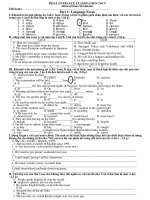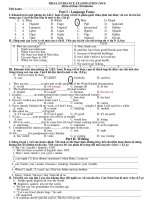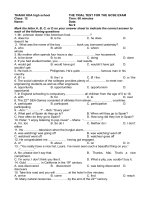- Trang chủ >>
- Sư phạm >>
- Sư phạm sinh
TRIAL TEST 189
Bạn đang xem bản rút gọn của tài liệu. Xem và tải ngay bản đầy đủ của tài liệu tại đây (83.95 KB, 5 trang )
SƠ GD&ĐT VINH PHUC
TRƯƠNG THPT LIÊN SƠN
(Đề thi gồm: 05 trang)
ĐỀ KTCL ƠN THI THPT QUỐC GIA NĂM 20172018
Mơn: TIẾNG ANH – ĐỀ SỐ 189
Thời gian làm bài: 60 phút, không kể thời gian phát
đề
Ho va tên thi sinh:……………………………………………………………………. SBD:…………………………
Mark the letter A, B, C, or D on your answer sheet to indicate the word whose underlined part
differs from the other three in pronunciation in each of the following questions.
Question 1. A. supply
B. viola
C. biannual
D. typhoon
Question 2. A. reproduction
B. domination
C. modification
D. conference
Mark the letter A, B, C, or D on your answer sheet to indicate the correct answer to each of the
following questions.
Question 3. A. technology
B. economics
C. achievement
D. dependent
Question 4. A. necessary
B. endangered
C. humidity
D. incredible
Mark the letter A, B, C, or D on your answer sheet to indicate the underlined part that needs
correction in each of the following questions.
Question 5. Some people often say that using cars is not as convenient than using motorbikes.
A. often say
B. using cars
C. than using
D. motorbikes
Question 6. It was not until the end of prehistoric times that the first wheeled vehicles appearing.
A. not until the end B. prehistoric
C. the first
D. appearing
Question 7. In the early 1900’s, Pennsylvania’s industries grew rapidly, a growth sometimes
accompanied by disputes labor.
A. industries
B. growth sometimes C. accompanied
D. disputes labor
Mark the letter A, B, C, or D on your answer sheet to indicate the correct answer to each of the
following questions.
Question 8. The last person________ will have to turn off the lights.
A. leaving
B. have left
C. to leave
D. left
Question 9. From an early age, Wolfgang had a(n)________ for music.
A. interest
B. passion
C. involvement
D. tendency
Question 10. Regular exercise and good diet will bring________ fitness and health.
A. from
B. to
C. about
D. up
Question 11. This shirt is________ that one.
A. much far expensive than
B. a bit less expensive
C. as much expensive as
D. not nearly as expensive as
Question 12. She was so tired last night that she slept like________ until 10 o’clock this morning.
A. a squirrel
B. death
C. a log
D. a hill
Question 13. My friend bought________ from a shop on Tran Phu street.
A. a nice brown leather belt
B. a brown nice leather belt
C. a leather brown nice belt
D. a nice leather brown belt
Question 14. He was so mean that he couldn’t bear to________ the smallest sum of money for the
charity appeal.
A. pay off
B. part with
C. give in
D. let out
Question 15. We are supposed________ the meeting without him.
A. begin
B. beginning
C. to begin
D. that begins
Question 16. Some supporters were________ at the entrance because the ground was full.
A. sent off
B. turned away
C. set out
D. played off
Question 17. I'm becoming increasingly________. Last week I locked myself out of the house twice.
A. oblivious
B. mindless
C. absent
D. forgetful
Question 18. James never remembers anything; he’s got a memory like_________.
A. cotton wool
B. a mouse
C. a sieve
D. a bucket
Question 19. I thought I saw water in the distance but it must have been an optical________.
© Đỗ Bình – THPT Liễn Sơn, Lập Thạch, Vĩnh Phúc – www.violet.vn/quocbinh72
Trang 1/5
A. error
B. illusion
C. delusion
D. deception
Mark the letter A, B, C, or D on your answer sheet to indicate the most suitable response to
complete each of the following exchanges.
Question 20. - Anna: “Would you like a glass of beer, Emma?” – Emma: “_______________________”
A. Yes, not too bad. B. I wouldn’t say no.
C. Yes, here you are. D. No, I don’t like.
Question 21. – Michel: "I failed my driving test again!"
– Nick: "_____________“
A. Congratulations! B. Don't mention it. C. It's my pleasure. D. I'm sorry to hear that.
Mark the letter A, B, C or D on your answer sheet to indicate the word(s) OPPOSITE in
meaning to the underlined word(s) in each of the following questions.
Question 22. Population growth rates vary among regions and even among countries within the
same region.
A. restrain
B. stay unchanged
C. remain unstable D. fluctuate
Question 23. In some countries, the disease burden could be prevented through environmental
improvements.
A. something to suffer
B. something enjoyable
C. something sad
D. something to entertain
Mark the letter A, B, C, or D on your answer sheet to indicate the word or phrase that is
CLOSEST in meaning to the underlined part in each of the following questions.
Question 24. The works of such men as the English philosophers John Locke and Thomas Hobbes
helped pave the way for academic freedom in the modern sense.
A. terminate
B. prevent
C. initiate
D. lighten
Question 25. E-cash cards are the main means of all transactions in a cashless society.
A. cash-starved
B. cash-strapped
C. cash-in-hand
D. cash-free
Read the following passage and mark the letter A, B, C, or D on your answer sheet to indicate
the correct word for each of the blanks
Wind, water, air, ice and heat all work to cause erosion. As the wind blows over the land, it
often (26)_________ small grains of sand. When these grains of sand strike against solid rocks, the
rocks are slowly worn away. In this way, even very hard rocks are worn away by the wind.
When particles of rocks or soil became loosened in any way, running water carries them
down the hillsides. Some rocks and soil particles are carried into streams and then into the sea.
Land that is covered with trees, grass and other plants wears away very slowly, and so loses
very (27)_________ of its soil. The roots of plants help to (28)_________ the rocks and soil in place.
Water that falls on grasslands runs away more slowly than water that falls on bare ground. Thus,
forests and grasslands help to slow down erosion.
Even where the land is (29)_________ covered with plants, some erosion goes on. In the
spring, the (30)_________ snow turns into a large quantity of water that then runs downhill in
streams. As a stream carries away some of the soil, the stream bed gets deeper and deeper. After
thousands
of
years
of
such
erosion,
wide
valleys
are
often
formed.
Question 26. A. holds up
B. cleans out
C. carries out
D. picks up
Question 27. A. large
B. little
C. few
D. much
Question 28. A. store
B. back
C. stay
D. hold
Question 29. A. thinly
B. strongly
C. thickly
D. scarcely
Question 30. A. melted
B. building
C. melting
D. formed
Read the following passage and mark the letter A, B, C, or D on your answer sheet to indicate
the correct answer to each of the question.
One of the factors contributing to the intense nature of twenty-first-century stress is our
continual exposure to media - particularly to an overabundance of news. If you feel stressed out by
the news, you are far from alone. Yet somehow many of us seem unable to prevent ourselves from
tuning in to an extreme degree. The further back we go in human history, the longer news took to
travel from place to place, and the less news we had of distant people and lands altogether. The
printing press obviously changed all that, as did every subsequent development in transportation
and telecommunication.
© Đỗ Bình – THPT Liễn Sơn, Lập Thạch, Vĩnh Phúc – www.violet.vn/quocbinh72
Trang 2/5
When television came along, it proliferated like a population of rabbits. In 1950, there were
100,000 television sets in North American homes; one year later there were more than a million.
Today, it’s not unusual for a home to have three or more television sets, each with cable access to
perhaps over a hundred channels. News is the subject of many of those channels, and on several of
them it runs 24 hours a day. What’s more, after the traumatic events of September 11, 2001, live
new-casts were paired with perennial text crawls across the bottom of the screen - so that viewers
could stay abreast of every story all the time. Needless to say, the news that is reported to us is not
good news, but rather disturbing images and sound bytes alluding to disaster (natural and manmade), upheaval, crime, scandal, war, and the like.
Compounding the problem is that when actual breaking news is scarce, most broadcasts fill
in with waistline, hairline, or very existence in the future. This variety of story tends to treat with
equal alarm a potentially lethal flu outbreak and the bogus claims of a wrinkle cream that
overpromises smooth skin. Are humans meant to be able to process so much trauma - not to
mention so much overblown anticipation of potential trauma - at once? The human brain,
remember, is programmed to slip into alarm mode when danger looms. Danger looms for
someone, somewhere at every moment. Exposing ourselves to such input without respite and
without perspective cannot be anything other than a source of chronic stress.
Question 31. According to the passage, which of the following has contributed to the intense
nature of twenty- first century stress?
A. An overabundance of special news
B. The degree to which stress affects our life
C. Our inability to control ourselves
D. Our continual exposure to the media
Question 32. In the past, we had less news of distant people and lands because________.
A. means of communication and transportation were not yet invented
B. the printing press changed the situation to slowly
C. printing, transportation, and telecommunications were not developed
D. most people lived in distant towns and villages
Question 33. The word “traumatic” in paragraph 4 is closest in meaning to________.
A. boring
B. fascinating
C. upsetting
D. exciting
Question 34. According to the passage, when there is not enough actual breaking news,
broadcasts________.
A. are full of dangerous diseases such as flu.
B. send out live newscasts paired with text across the screen
C. send out frightening stories about potential dangers
D. are forced to publicise an alarming increase in crime
Question 35. Which of the following is NOT true, according to the passage?
A. The news that is reported to us is not good news.
B. Many people are under stress caused by the media.
C. Many TV channels supply the public with breaking news.
D. The only source of stress in our modern life is the media.
Question 36. The word “slip” in paragraph 6 is closest in meaning to________.
A. release
B. bring
C. fail
D. fall
Question 37. According to the passage, our continual exposure to bad news without perspective is
obviously________.
A. the result of human brain’s switch to alarm mode.
B. a source of chronic stress.
C. the result of an overabundance of good news. D. a source of defects in human brain.
Question 38. What is probably the best title for this passage?
A. Effective Ways to Beat Stress
B. More Modern Life - More Stress
C. The Media - A Major Cause of Stress
D. Developments in Telecommunications
Read-the following passage and mark the letter A, B, C or D on your answer sheet to indicate
the correct answer to each of the questions.
THE SAVANNAH
The tourist looking at the African savannah on a summer afternoon might be excused for
thinking that the wide yellow grass plain was completely deserted of life, almost a desert. With
only a few small thorn trees sticking out through the veldt, there seems to be almost no place for a
© Đỗ Bình – THPT Liễn Sơn, Lập Thạch, Vĩnh Phúc – www.violet.vn/quocbinh72
Trang 3/5
living creature to hide. However, under those trees you might find small steenbok, sleeping in the
shade, and waiting for the night to fall. There may even be a small group of lions somewhere, their
bodies exactly the same shade as the tall grass around them. In the holes in the ground a host of
tiny creatures, from rabbits and badgers to rats and' snakes are waiting for the heat to finish.
The tall grass also hides the fact that there may be a small stream running across the
middle of the plain. One clue that there may be water here is the sight of a majestic Marshall eagle
circling slowly over the grassland. When he drops, he may come up with a small fish, or maybe a
grass snake that has been waiting at the edge of a pool in the hope of catching a frog. The best time
to see the animals then, is in the evening, just as the sun is setting.
The best time of the year to come is in late September, or early August, just before the rains.
Then the animals must come to the waterholes, as there is no other place for them to drink. And
they like to come while it is still light; so they can see if any dangers are creeping up on them. So it
is at sunset, and after the night falls, that the creatures of the African veld rise and go about their
business.
Question 39. The savannah appears to be empty because________.
A. The animals are sleeping
B. The animals have gone about their business
C. They have been frightened by an eagle D. The temperature prevents much activity
Question 40. By "go about their business" the writer means:
A. Tourism in Africa is big business
B. The animals go to the river to drink
C. The animals go on with their normal activity
D. The animals are observed by naturalists
Question 41. What kind of book does the text seem to be from?
A. A book for experts on wildlife
B. A fictional story
C. A history of Africa
D. General non-fiction
Question 42. The phrase "be excused for” in paragraph 1 is closest in meaning to________.
A. easily make a mistake of
B. feel sorry for
C. be regretting for
D. be actually forgiven for
Question 43. The phrase "a host of " in paragraph 2 is closest in meaning to________.
A. a large number of
B. only a few
C. a group of
D. a gang of
Question 44. Why do animals come to the waterholes while it is still light?
A. To see their ways better
B. To be alert to the possibility of danger
C. To drink enough water before hunting
D. To avoid people watching them
Question 45. The word "he" in paragraph 3 refers to________.
A. a person
B. the writer
C. a Marshall eagle D. a small fish
Mark the letter A, B, C, or D on your answer sheet to indicate the sentence that best combines
each pair of sentences in the following questions.
Question 46. We spend about one-third of our lives sleeping. We know relatively little about sleep.
A. We know relatively little about sleep; as a result, we spend about one-third of our lives
sleeping.
B. We shall know more about sleep if we spend more than one-third of our lives sleeping.
C. Despite spending about one-third of our lives sleeping, we know relatively little about
sleep.
D. We spend about one-third of our lives sleeping so that we know relatively little about
sleep.
Question 47. Overeating is a cause of several deadly diseases. Physical inactivity is another cause of
several deadly diseases.
A. Not only overeating but also physical inactivity may lead to several deadly diseases.
B. Apart from physical activities, eating too much also contributes to several deadly
diseases.
C. Both overeating and physical inactivity result from several deadly diseases.
D. Overeating and physical inactivity are caused by several deadly diseases.
Mark the letter A, B, C, or D on your answer sheet to indicate the sentence that is CLOSEST in
meaning to each of the following questions.
© Đỗ Bình – THPT Liễn Sơn, Lập Thạch, Vĩnh Phúc – www.violet.vn/quocbinh72
Trang 4/5
Question 48. "Why don't we wear sunglasses?" our grandpa would say when we went out on bright
sunny days.
A. Our grandpa used to suggest wearing sunglasses when we went out on bright sunny
days.
B. Our grandpa would warn us against wearing sunglasses on bright sunny days.
C. Our grandpa asked us why we did not wear sunglasses when going out on bright sunny
days.
D. Our grandpa reminded us of going out with sunglasses on bright sunny days.
Question 49. I am sure he did not know that his brother graduated with flying colors.
A. He should not have been envious of his brother's achievement.
B. He cannot have known that his brother graduated with very high marks.
C. That his brother graduated with flying colors must have been appreciated by him.
D. He may not know that his brother is flying gradually up in a colorful balloon.
Question 50. People say that Mr. Goldman gave nearly a million pounds to charity last year.
A. Mr. Goldman is said to have given nearly a million pounds to charity last year.
B. Mr. Goldman was said to have given nearly a million pounds to charity last year.
C. Nearly a million pounds was said to have been given to charity by Mr. Goldman last year.
D. Nearly a million pounds is said to be given to charity by Mr. Goldman last year.
___________THE END___________
© Đỗ Bình – THPT Liễn Sơn, Lập Thạch, Vĩnh Phúc – www.violet.vn/quocbinh72
Trang 5/5


